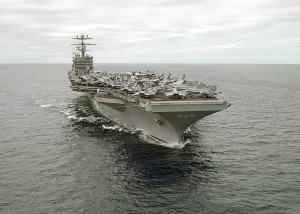[Based on our present knowledge, the latest armed clash between North and South Korea is based on this sequence of events: Tens of thousands of South Korean forces were conducting military exercises near the border with North Korea; South Korean forces fired their artillery into waters near Yeonpyeong island that are claimed by both the North and the South; North Korean artillery fire hit a South Korean marine installation on the island; and South Korea returned artillery fire. The US and Western imperialist press immediately charged that this was an “unprovoked attack” by North Korea. Obama then ordered the USS George Washington aircraft carrier to South Korea to conduct “joint exercises” in a show of solidarity with the South Korean government.
As the article posted below points out, the dispatch of the USS George Washington to the Yellow Sea is also meant to send a message to the Chinese government to place more pressure on North Korea to back off militarily. The US imperialists are well aware that China is the only country with any leverage over North Korea, since it supplies most of North Korea’s energy and food. China does this not out of “socialist solidarity” (neither of them are socialist), but to keep North Korea from collapsing, generating a flood of refugees into China. Even more importantly, a disintegrating North Korea could lead to a unified Korea, with a US military presence on China’s border.
The South Korean government claimed that it was the victim of North Korean “aggression,” and threatened to launch air strikes on North Korean artillery bases. It also received assistance from the bourgeois media in ensuring that its responsibility for the armed clash would not be subject to public scrutiny. This response points to the “carrot and stick” approach of the South Korean government and the US imperialists to the North Korean government. The “stick” has consisted of tight economic sanctions and constant military pressure (including initiating some of these armed clashes) that force the North Korean government to match South Korean military spending. The “carrot” is the offer of substantial economic aid and investments (in export processing zones) if North Korea agrees to discontinue its nuclear weapons program.
There are two reasons underlying North Korea’s policy of engaging South Korean forces in “lightning” military actions (see the history of armed actions from 1999 to the present below): First, these continual armed clashes maintain political legitimacy and stability for a weak North Korean regime by raising the level of nationalism and reinforcing the official line that North Korea is under perpetual siege from the US and South Korea. Second, the hereditary “communist” dynasty that has ruled North Korea for decades is in a desperate economic situation, and is having great difficulty maintaining its huge military forces. To handle this situation, the North Korean government has been expanding its nuclear weapons program and engaging the South Korean military in small actions as bargaining chips to extract the largest amount of economic aid as possible from South Korea and the US. This is a high-stakes gamble. The recent actions of the North Korean government will more likely lead to tighter Western sanctions and increased US pressure on China to force North Korea to back off from its military/nuclear ambitions–and come to terms with South Korea and US imperialism.–Frontlines ed]
New York Times, November 23, 2010
U.S. to Send Carrier for Joint Exercises Off Korea

Smoke on Yeonpyeong island after the artillery attack
WASHINGTON — President Obama and South Korea’s president agreed Tuesday night to hold joint military exercises as a first response to North Korea’s deadly shelling of a South Korean military installation, as both countries struggled for the second time this year to keep a North Korean provocation from escalating into war.
What steps should the U.S. take after the artillery attack on a South Korean island?
The exercise will include sending the aircraft carrier George Washington and a number of accompanying ships into the region, both to deter further attacks by the North and to signal to China that unless it reins in its unruly ally it will see an even larger American presence in the vicinity.
The decision came after Mr. Obama attended the end of an emergency session in the White House Situation Room and then emerged to call President Lee Myung-bak of South Korea to express American solidarity and talk about a coordinated response. But as a former national security official who dealt frequently with North Korea in the Bush administration, Victor Cha, said just a few hours before the attack began, North Korea is “the land of lousy options.”
Mr. Obama is once again forced to choose among unpalatable choices: responding with verbal condemnations and a modest tightening of sanctions, which has done little to halt new attacks; starting military exercises that are largely symbolic; or reacting strongly, which could risk a broad war in which South Korea’s capital, Seoul, would be the first target. Continue reading →



